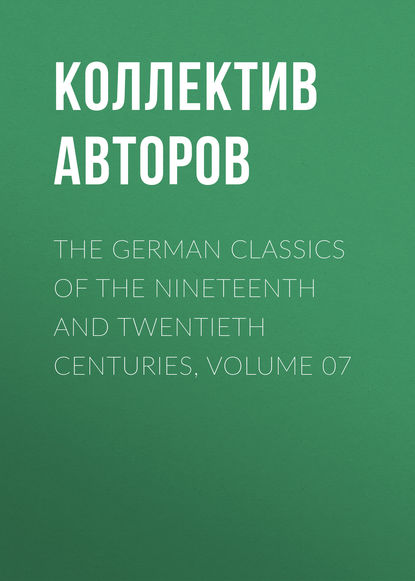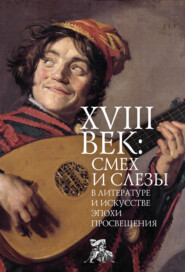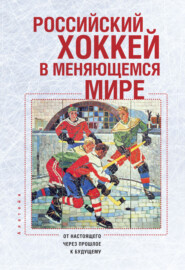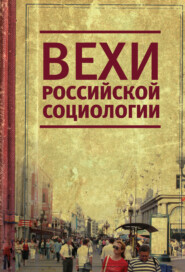По всем вопросам обращайтесь на: info@litportal.ru
(©) 2003-2024.
✖
The German Classics of the Nineteenth and Twentieth Centuries, Volume 07
Настройки чтения
Размер шрифта
Высота строк
Поля
Through the possession of this quality, Bettina, though not herself of heroic mold, enters the society of the great heroines and speaks to posterity. Ariadne on the island of Naxos lives not more truly in Ovid's poetical Epistles, than Bettina in the Correspondence. But Bettina has not, like Ariadne, had immortality conferred upon her through the verses of two great poets. She has rather taken it for herself, as Goethe said she was wont to do, in anticipating every gift. It is accordingly not in the Elegiacs of Ovid, flowing as a counter-stream to Lethe, that we may discern Bettina's gesture of immortal repose as a metamorphosed heroine. She is a type of the inspired lyrical nature, a belated child of the Renaissance. A graceful English song-writer of the Elizabethan period, Thomas Campion, who was as fond as Bettina of the figure of the flower and the sun, through which she symbolized her relation to Goethe, has in his verses anticipated her pose and her tone of agitated expectancy:
"Is [he] come? O how near is [he]?
How far yet from this friendly place?
How many steps from me?
When shall I [him] embrace?
These armes I'll spread, which only at (his) sight shall close,
Attending, as the starry flower that the sun's noone-tide knowes."
Campion termed his verses Light Conceits of Lovers. It is difficult to weigh Bettina's fancies, for she has, as it were, taken the scales with her when she closed the Correspondence: but it is only just to say of her Letters, that they realize, as a whole, Tasso's description of the permanent state of the true lover: "Brama assai, poco spera e nulla chiede" (Desire much, hope little and nothing demand).
GOETHE'S CORRESPONDENCE WITH A CHILD (1835)
BY BETTINA VON ARNIM TRANSLATED BY WALLACE SMITH MURRAY
LETTERS TO GOETHE'S MOTHER
May 11, 1807.
Dear Frau Rat:
I have been lying in bed for some time, but shall get up now to write you all about our trip. I wrote you that we passed through the military lines in male attire. Just before we reached the city gate my brother-in-law made us get out, because he wanted to see how becoming the clothes were. Lulu looked very well in them, for she has a splendid figure and the fit was perfect, whereas all my clothes were too loose and too long and looked as if I had bought them at a rag fair. My brother-in-law laughed at me and said I looked like a Savoyard boy and could be of great service to them. The coachman had driven us off the road through a forest, and when we came to a cross-road he didn't know which way to turn. Although it was only the beginning of the four weeks' trip, I was afraid we might get lost and then arrive in Weimar too late. I climbed up the highest pine and soon saw where the main road lay. I made the whole trip on the driver's box, with a fox-skin cap on my head and the brush hanging down my back. Whenever we arrived at a station, I would unharness the horses and help hitch up the fresh ones, and would speak broken German with the postilions as though I were a Frenchman. At first we had beautiful weather, just as though spring were coming; but soon it turned very cold and wintry. We passed through a forest of huge pines and firs all covered with frost; everything was spotless, for not a soul had driven along the road, which was absolutely white. Moreover the moon shone upon this deserted paradise of silver; a death-like stillness reigned-only the wheels creaked from the cold. I sat up on the box and wasn't a bit cold; winter weather strikes sparks from me! Along toward midnight we heard some one whistling in the forest. My brother-in-law handed me a pistol out of the carriage and asked whether I should have the courage to shoot in case robbers came along. I said "Yes," and he answered, "But don't shoot too soon." Lulu, who was inside the carriage, was frightened nearly to death, but where I was, out under the open sky, with my pistol cocked and my sabre buckled on, countless stars twinkled above me, the glistening trees casting their gigantic shadows on the broad, moon-lit way—all that made me brave away up on my lofty seat! Then I thought of him and wondered, if he had met me under such circumstances in his youthful years, whether it would not have made so poetic an impression on him that he would have composed sonnets to me and never have forgotten me. Now perhaps he thinks differently, and has probably risen above such a magic impression. It may be that higher qualities—how shall I ever attain them?—will maintain a right over him, unless eternal fidelity, cleaving to his threshold, finally wins him for me! Such was my mood on that cold, clear, winter night, in which I found no occasion to shoot off my pistol. Not until daybreak did I receive permission to fire it. The carriage stopped and I ran into the forest and bravely shot it off into the dense solitude, in honor of your son. In the meantime our axle had broken; we felled a tree with an axe we had with us and bound it securely with ropes; then my brother-in-law discovered how handy I was and complimented me. Thus we went on to Magdeburg. Precisely at seven o'clock in the evening the fortress gates are closed; we arrived just a minute late and had to wait outside till seven the next morning. It wasn't very cold, and the two inside the chaise went to sleep. In the night it began to snow; I had pulled my cloak over my head and sat quietly in my exposed seat. In the morning they peeped out of the carriage at me and beheld a snow man; but before they could get thoroughly frightened I threw off the cloak under which I had kept quite warm. In Berlin I was like a blind man in a throng and was so absent-minded that I could take no interest in anything. I only longed for a dark place where I shouldn't be disturbed and could think of the future that was so near at hand. Oh, mother, mother, think of your son! If you knew you were to see him in a short time, you too would be like a lightning-rod attracting every flash of lightning. When we were only a few miles from Weimar, my brother-in-law said he did not wish to make the detour through Weimar, but would rather take another road. I remained silent, but Lulu would not hear of it; she said it had been promised me and he would have to keep his word. Oh, mother, the sword hung by a hair over my head, but I managed to escape from under it.
We reached Weimar at twelve o'clock and sat down to dinner, but I couldn't eat. The other two lay down on the sofa and went to sleep, for we hadn't slept in three nights. "I advise you," said my brother-in-law, "to take a rest too; it won't make much difference to Goethe whether you go to see him or not, and there's nothing remarkable to see in him anyway." Can you imagine how these words discouraged me? Oh, I didn't know what to do, all alone in a strange town. I had changed my dress and stood at the window and looked at the town clock; it was just striking half-past two. It seemed to me, too, that Goethe wouldn't care particularly about seeing me; I remembered that people called him proud. I compresses my heart to quell its yearning. Suddenly the clock struck three, and then it seemed exactly as though he had called me. I ran down for the servant, but there was no carriage to be found. "Will a sedan chair do?" "No," I said, "that's an equipage for the hospital"—and we went on foot. There was a regular chocolate porridge in the streets and I had to have myself carried over the worst bogs. In this way I came to Wieland, not to your son. I had never seen Wieland, but I pretended to be an old acquaintance. He thought and thought, and finally said, "You certainly are a dear familiar angel, but I can't seem to remember when and where I have seen you." I jested with him and said, "Now I know that you dream of me, for you can't possibly have seen me elsewhere!" I had him give me a note to your son which I afterwards took with me and kept as a souvenir. Here's a copy of it: "Bettina Brentano, Sophie's sister, Maximilian's daughter, Sophie La Roche's granddaughter wishes to see you, dear brother, and pretends that she's afraid of you and that a note from me would serve as a talisman and give her courage. Although I am pretty certain that she is merely making sport of me, I nevertheless have to do what she wants and I shall be astonished if you don't have the same experience. W.
April 23, 1807."
With this note I sallied forth. The house lies opposite the fountain—how deafening the waters sounded in my ears! I ascended the simple staircase; in the wall stand plaster statues which impose silence—at any rate I couldn't utter a sound in this sacred hallway. Everything is cheery and yet solemn! The greatest simplicity prevails in the rooms, and yet it is all so inviting! "Do not fear," said the modest walls, "he will come, and he will be, and he will not claim to be more than you." And then the door opened and there he stood, solemnly serious, with his eyes fixed upon me. I stretched out my hands toward him, I believe, and soon I knew no more. Goethe caught me up quickly to his heart. "Poor child, did I frighten you?"—those were the first words through which his voice thrilled my heart. He led me into his room and placed me on the sofa opposite him. There we sat, both mute, until at last he broke the silence. "You have doubtless read in the paper that we suffered a great bereavement a few days ago in the death of the Duchess Amalia."
"Oh," I said, "I do not read the papers."
"Why, I thought everything that goes on in Weimar interests you."
"No, nothing interests me but you alone, and therefore I'm far too impatient to pore over the papers."
"You are a kind child." A long pause—I, glued in such anxiety to the odious sofa; you know how impossible it is for me to sit up in such well-bred fashion. Oh, mother, is it possible for any one to forget herself thus?
Suddenly I said, "I can't stay here on this sofa any longer," and jumped up.
"Well," said he, "make yourself comfortable;" and with that I flew into his arms. He drew me on his knee and pressed me to his heart. Everything was quiet, oh, so quiet, and then all vanished. I hadn't slept for so long—years had passed in longing for him—and I fell asleep on his breast. When I awoke a new life began for me. I'll not write you more this time.
BETTINA.
May, 1807.
* * * Yes, man has a conscience; it exhorts him to fear nothing and to leave no demand of the heart unsatisfied. Passion is the only key to the world and through it the spirit learns to know and feel everything, for how could he enter the world otherwise? And so I feel that only through my love for him am I born into the spirit, that only through him the world is opened to me where the sun shines and day becomes distinct from night. The things I do not learn through this love, I shall never comprehend. I wish I were a poor beggar girl and might sit at his door-step, and take a morsel of bread from him, and that in my glance my soul would be revealed to him. Then he would draw me close to him and wrap me in his cloak, that I might grow warm. Surely he would not bid me depart; I could remain, wandering on and on in his home. And so the years would roll by and no one would know who I am and no one would know what had become of me, and thus the years and life itself would go by. The whole world would be mirrored in his face, and I should have no need of learning anything more.* * *
October, 1808.
* * * I hadn't yet seen him at that time when you used to while away for me those hours of ardent longing by picturing to me in a thousand different ways our first meeting and his joyous astonishment. Now I know him and I know how he smiles and the tone of his voice—how calm it is and yet so full of love; and his exclamations—how they come swelling from the depths of his heart like the tones of a melody, and how gently he soothes and affirms what surges forth in wild disorder from an overflowing heart. When I met him so unexpectedly again last year, I was so beside myself and wanted to speak, but simply could not compose myself. Then he placed his fingers on my lips and said, "Speak with your eyes—I understand it all"; and when he saw that they were full of tears he pressed my eyelids down and said; "Quiet, quiet, that is best for both of us!" Yes, dear mother, quiet was instantly suffused through my whole being, for didn't I possess everything for which I had longed for years! Oh, mother, I shall never cease thanking you for bearing this friend; where else could I have found him? Now don't laugh at me, but remember that I loved him before I knew the least thing about him, and if you had not borne him what would have become of him? That is a question you cannot answer.
* * * Thus a part of the winter passed. I was in a very happy frame of mind—others might call it exaltation, but it was natural to me. By the fortress wall that surrounded the large garden there was a watch-tower with a broken ladder inside. A house close by had been broken into, and though the thieves could not be traced it was believed they were concealed in the tower. I had examined it by day and seen that it would be impossible for a strong man to climb up this very high ladder, which was rotten and lacked many rungs. I tried it, but slid down again after I had gone up a short distance. In the night, after I had lain in bed awhile and Meline was asleep, the thought left me no peace. I threw a cloak about my shoulders, climbed out of the window, and walked by the old Marburg castle, where the Elector Philip and Elizabeth peeped laughingly out of the window. Often enough in the daytime I had observed this marble couple leaning far out of the window arm in arm, as though they wanted to survey their lands; but now at night I was so afraid of them that I jumped quickly into the tower. There I seized the ladder and helped myself up, heaven knows how; what I was unable to do in the daytime I accomplished at night with anxiously throbbing heart. When I was almost at the top, I stopped and considered that the thieves might really be up there and that they might attack me and hurl me from the tower. There I hung, not knowing whether to climb up or down, but the fresh air I scented lured me to the top. What feelings came over me when I suddenly, by snow and moonlight, surveyed the landscape spread out beneath me and stood there, alone and safe, with the great host of stars above me! Thus it is after death; the soul, striving to free itself, feels the burden of the body most as it is about to cast it off, but it is victorious in the end and relieved of its anguish. I was conscious only of being alone and nothing was closer to me at that moment than my solitude; all else had to vanish before this blessing. * * *
LETTERS to GOETHE
May 25, 1807.
* * * Ah, I can impart nothing else to thee than simply that which goes on in my heart! "Oh, if I could be with him now!" I thought, "the sunlight of my joy would beam on him with radiance as glowing as when his eye meets mine in friendly greeting. Oh, how splendid! My mind a sky of purple, my words the warm dew of love; my soul must issue like an unveiled bride from her chamber and confess: "Oh, lord and master, in the future I will see thee often and long by day, and the day shall often be closed by such an evening as this."
This I promise—that whatever goes on in my soul, all that is untouched by the outer world, shall be secretly and faithfully revealed to him who takes such loving interest in me and whose all-embracing power assures abundant, fruitful nourishment to the budding germs within my breast!
Without faith the lot of the soul is hard; its growth is slow and meagre like that of a hot-plant between rocks. Thus am I—thus I was until today—and this fountain of my heart, always without an outlet, suddenly finds its way to the light, and banks of balsam-breathing fields, blooming like paradise, accompany it on its way.
Oh, Goethe! My longing, my feelings, are melodies seeking a song to cling to! May I cling to thee? Then shall these melodies ascend high enough to accompany thy songs!* * *
June 20, 1807.
* * * I cannot resist telling thee what I have dreamed of thee at night—as if thou wert in the world for no other purpose. Often I have had the same dream and I have pondered much why my soul should always commune with thee under the same conditions. It is always as though I were to dance before thee in ethereal garments. I have a feeling that I shall accomplish all. The crowd surrounds me. Now I seek thee, and thou sittest opposite me calm and serene as if thou didst not observe me and wert busy with other things. Now I step out before thee with shoes of gold and my silvery arms hanging down carelessly—and wait. Then thou raisest thy head, involuntarily thy gaze is fixed upon me as I describe magic circles with airy tread. Thy eye leaves me no more; thou must follow me in my movements, and I experience the triumph of success! All that thou scarcely divinest I reveal to thee in the dance, and thou art astonished at the wisdom concealed in it. Soon I cast off my airy robe and show thee my wings and mount on high! Then I rejoice to see thy eye following me, and I glide to earth again and sink into thy embrace. Then thou sighest and gazest at me in rapture. Waking from these dreams I return to mankind as from a distant land; their voices seem so strange and their demeanor too! And now let me confess that my tears are flowing at this confession of my dreams. * * *
March 15, 1808.
When in a few weeks I go into the Rhine country, for spring will be here then, I shall write thee from every mountain; I am always so much nearer thee when I am outside the city walls. I sometimes seem to feel thee then with every breath I take. I feel thee reigning in my heart when it is beautiful without, when the air caresses; yes, when nature is good and kind like thee, then I feel thee so distinctly! * * *
* * * All other men seem to me as one and the same—I do not distinguish between them, and I take no interest in the great universal sea of human events. The stream of life bears thee, and thou me. In thy arms I shall pass over it, and thou wilt bear me until the end—wilt thou not? And even though there were thousands of existences yet to come, I can not take wing to them, for with thee I am at home. So be thou also at home in me—or dost thou know anything better than me and thee in the magic circle of life? * * *
March 30, 1808.
* * * The vineyards were still partially covered with snow. I was sitting on a broken window-bar and freezing, yet my ardent love for thee permeated my being. I was trembling for fear of falling, yet I climbed still higher because it occurred to me too venturesome for thy sake; thus thou often inspirest me with daring. It was fortunate that the wild wolves from the Odenwald[11 - A mountain range between the Neckar and Main rivers.] did not appear, for I should have grappled with them had I thought of thy honor. It seems foolish, but it's true.—Midnight, the evil hour of spirits, awakens me, and I lie at the window in the cold winter wind. All Frankfurt is dead, the wicks in the street lamps are on the point of expiring, and the old rusty weather-vanes cry out to me, and I ask myself, is that the eternal tune? Then I feel that this life is a prison where we all have only a pitiful vision of real freedom; that is one's own soul. Then a tumult rages in my breast and I long to soar above these old pointed gabled roofs that cut off heaven from me. I leave my chamber, run through the wide halls of our house, and search for a way through the old garrets. I suspect there are ghosts behind the rafters, but I do not heed them. Then I seek the steps to the little turret, and, when I am at last on top, I look out through the small window at the wide heavens and am not at all cold. It seems to me then as if I must give vent to all my pent-up tears, and the next day I am so cheerful and feel new-born, and I look with cunning for a prank to play. And—canst thou believe it?—all this is—thou!
May, 1808.
If it pleases thee to see me at thy feet in deep shame and confusion, then look down upon me now. Thus does the poor shepherd-maiden fare, on whose head the king places a crown; even though her heart be proud to love him, yet the crown is too heavy and her little head staggers under the burden. And besides, she is intoxicated with the honor and the homage which her beloved pays her.
Oh, I shall be careful never to complain again or to pray for fine weather, for I cannot bear the blinding sunbeams! No, rather sigh in silent darkness than be led by thy muse into the brilliant daylight, confused and crowned—that breaks my heart. O, do not gaze on me so long; remove the crown and press me to thy heart! Teach me to forget in thee that thou returnest me, glorified, to myself.
July 7, 1808.
* * * Ah, the rainbow even now setting its diamond foot on the meadow at Ingelheim and reaching over the house to Mount St. John is just like the blissful illusion I have of thee and me! The Rhine, spreading out its net to catch the vision of its banks of paradise, is like this flame of life nourished by reflections of the unattainable. Let it then win nothing more from reality than this illusion; it will give to me the peculiar spirit and the character expressive of my own self, just as the reflection does to the river in which it is mirrored. * * *
July 18, 1808.
* * * Yesterday evening I went up the Rochus mountain alone and wrote thee thus far; then I dreamed a little, and when I came to myself I thought the sun was just going down, but it was the rising moon. I was astonished and should have been afraid, but the stars wouldn't let me—these hundreds of thousands and I together on that night. Who am I, then, that I should be of raid? Am I not numbered with them? I didn't dare descend and, besides, I shouldn't have found a boat to cross in. The nights aren't so very long now, anyway, so I turned over on the other side, said "good night" to the stars and was soon fast asleep. Now and then I was awakened by flitting breezes, and then I thought of thee. As often as I awoke I called thee to me and always said in my heart: "Goethe be with me, that I may not be afraid." Then I dreamed that I was floating along the reedy banks of the Rhine, and where it is deepest between black rocky cliffs the ring thou gavest me slipped off. I saw it sinking deeper and deeper till it reached the bottom. I wanted to call for help, but then I awoke in the radiance of the morning, rejoicing that the ring was still on my finger. Ah, prophet, interpret my dream for me! Anticipate fate, and let no dangers beset our love after this beautiful night when, betwixt fear and joy, in counsel with the stars, I thought of thy future!
* * * No one knows where I was—and, even if they did, could they imagine why I was there? Thou tamest toward me through the whispering forest, enveloped in a soft haze, and when thou wert quite near me my tired senses could not endure it, so strong was the fragrance of the wild thyme. Then I fell asleep—it was so beautiful—all blossoms and fragrance! And the great boundless host of stars and the flickering silver moon that danced near and far upon the stream, the intense stillness of nature in which one hears all that stirs—ah, I feel my soul implanted here in this nocturnal trembling! Future thoughts are blossoming here; these cold dew-pearls that weigh down grass and herbs, from these the spirit grows! Oh, it hastens to blossom for thee, Goethe! It will unfold its gayest colors before thee! It is for love of thee that I wish to think, that I struggle with the inexpressible. Thou lookest upon me in spirit and thy gaze draws thoughts from me, and then I am often compelled to say things I do not understand but only see.
The spirit also has senses. Just as there is much that we only hear, or only see, or only feel, so there are thoughts which the spirit also perceives with only one of these senses. Often I only see what I am thinking; often I only feel it, and when I hear it I experience a shock. I do not know how I come by this knowledge which is not the fruit of my own meditation. I look about me for the author of this opinion and then conclude that it is all created from the fire of love. There is warmth in the spirit; we feel it; the cheeks glow from our thoughts and cold chills come over us, which fan our inspiration into new flame. Yes, dear friend, this morning when I awoke it seemed to me as though I had experienced great things, as though the pledges of my heart had wings and soared over hill and dale into the pure, serene, radiant ether. No vow, no conditions—nothing but appropriate motion, pure striving for the divine. This is my pledge: Freedom from all ties, and that I will have faith only in that spirit which reveals the beautiful and prophesies eternal bliss. * * *
We were on the road five days, and since then it has rained incessantly. The whole house full of guests, and not even a little corner where I could enjoy solitude and write thee!
"Is [he] come? O how near is [he]?
How far yet from this friendly place?
How many steps from me?
When shall I [him] embrace?
These armes I'll spread, which only at (his) sight shall close,
Attending, as the starry flower that the sun's noone-tide knowes."
Campion termed his verses Light Conceits of Lovers. It is difficult to weigh Bettina's fancies, for she has, as it were, taken the scales with her when she closed the Correspondence: but it is only just to say of her Letters, that they realize, as a whole, Tasso's description of the permanent state of the true lover: "Brama assai, poco spera e nulla chiede" (Desire much, hope little and nothing demand).
GOETHE'S CORRESPONDENCE WITH A CHILD (1835)
BY BETTINA VON ARNIM TRANSLATED BY WALLACE SMITH MURRAY
LETTERS TO GOETHE'S MOTHER
May 11, 1807.
Dear Frau Rat:
I have been lying in bed for some time, but shall get up now to write you all about our trip. I wrote you that we passed through the military lines in male attire. Just before we reached the city gate my brother-in-law made us get out, because he wanted to see how becoming the clothes were. Lulu looked very well in them, for she has a splendid figure and the fit was perfect, whereas all my clothes were too loose and too long and looked as if I had bought them at a rag fair. My brother-in-law laughed at me and said I looked like a Savoyard boy and could be of great service to them. The coachman had driven us off the road through a forest, and when we came to a cross-road he didn't know which way to turn. Although it was only the beginning of the four weeks' trip, I was afraid we might get lost and then arrive in Weimar too late. I climbed up the highest pine and soon saw where the main road lay. I made the whole trip on the driver's box, with a fox-skin cap on my head and the brush hanging down my back. Whenever we arrived at a station, I would unharness the horses and help hitch up the fresh ones, and would speak broken German with the postilions as though I were a Frenchman. At first we had beautiful weather, just as though spring were coming; but soon it turned very cold and wintry. We passed through a forest of huge pines and firs all covered with frost; everything was spotless, for not a soul had driven along the road, which was absolutely white. Moreover the moon shone upon this deserted paradise of silver; a death-like stillness reigned-only the wheels creaked from the cold. I sat up on the box and wasn't a bit cold; winter weather strikes sparks from me! Along toward midnight we heard some one whistling in the forest. My brother-in-law handed me a pistol out of the carriage and asked whether I should have the courage to shoot in case robbers came along. I said "Yes," and he answered, "But don't shoot too soon." Lulu, who was inside the carriage, was frightened nearly to death, but where I was, out under the open sky, with my pistol cocked and my sabre buckled on, countless stars twinkled above me, the glistening trees casting their gigantic shadows on the broad, moon-lit way—all that made me brave away up on my lofty seat! Then I thought of him and wondered, if he had met me under such circumstances in his youthful years, whether it would not have made so poetic an impression on him that he would have composed sonnets to me and never have forgotten me. Now perhaps he thinks differently, and has probably risen above such a magic impression. It may be that higher qualities—how shall I ever attain them?—will maintain a right over him, unless eternal fidelity, cleaving to his threshold, finally wins him for me! Such was my mood on that cold, clear, winter night, in which I found no occasion to shoot off my pistol. Not until daybreak did I receive permission to fire it. The carriage stopped and I ran into the forest and bravely shot it off into the dense solitude, in honor of your son. In the meantime our axle had broken; we felled a tree with an axe we had with us and bound it securely with ropes; then my brother-in-law discovered how handy I was and complimented me. Thus we went on to Magdeburg. Precisely at seven o'clock in the evening the fortress gates are closed; we arrived just a minute late and had to wait outside till seven the next morning. It wasn't very cold, and the two inside the chaise went to sleep. In the night it began to snow; I had pulled my cloak over my head and sat quietly in my exposed seat. In the morning they peeped out of the carriage at me and beheld a snow man; but before they could get thoroughly frightened I threw off the cloak under which I had kept quite warm. In Berlin I was like a blind man in a throng and was so absent-minded that I could take no interest in anything. I only longed for a dark place where I shouldn't be disturbed and could think of the future that was so near at hand. Oh, mother, mother, think of your son! If you knew you were to see him in a short time, you too would be like a lightning-rod attracting every flash of lightning. When we were only a few miles from Weimar, my brother-in-law said he did not wish to make the detour through Weimar, but would rather take another road. I remained silent, but Lulu would not hear of it; she said it had been promised me and he would have to keep his word. Oh, mother, the sword hung by a hair over my head, but I managed to escape from under it.
We reached Weimar at twelve o'clock and sat down to dinner, but I couldn't eat. The other two lay down on the sofa and went to sleep, for we hadn't slept in three nights. "I advise you," said my brother-in-law, "to take a rest too; it won't make much difference to Goethe whether you go to see him or not, and there's nothing remarkable to see in him anyway." Can you imagine how these words discouraged me? Oh, I didn't know what to do, all alone in a strange town. I had changed my dress and stood at the window and looked at the town clock; it was just striking half-past two. It seemed to me, too, that Goethe wouldn't care particularly about seeing me; I remembered that people called him proud. I compresses my heart to quell its yearning. Suddenly the clock struck three, and then it seemed exactly as though he had called me. I ran down for the servant, but there was no carriage to be found. "Will a sedan chair do?" "No," I said, "that's an equipage for the hospital"—and we went on foot. There was a regular chocolate porridge in the streets and I had to have myself carried over the worst bogs. In this way I came to Wieland, not to your son. I had never seen Wieland, but I pretended to be an old acquaintance. He thought and thought, and finally said, "You certainly are a dear familiar angel, but I can't seem to remember when and where I have seen you." I jested with him and said, "Now I know that you dream of me, for you can't possibly have seen me elsewhere!" I had him give me a note to your son which I afterwards took with me and kept as a souvenir. Here's a copy of it: "Bettina Brentano, Sophie's sister, Maximilian's daughter, Sophie La Roche's granddaughter wishes to see you, dear brother, and pretends that she's afraid of you and that a note from me would serve as a talisman and give her courage. Although I am pretty certain that she is merely making sport of me, I nevertheless have to do what she wants and I shall be astonished if you don't have the same experience. W.
April 23, 1807."
With this note I sallied forth. The house lies opposite the fountain—how deafening the waters sounded in my ears! I ascended the simple staircase; in the wall stand plaster statues which impose silence—at any rate I couldn't utter a sound in this sacred hallway. Everything is cheery and yet solemn! The greatest simplicity prevails in the rooms, and yet it is all so inviting! "Do not fear," said the modest walls, "he will come, and he will be, and he will not claim to be more than you." And then the door opened and there he stood, solemnly serious, with his eyes fixed upon me. I stretched out my hands toward him, I believe, and soon I knew no more. Goethe caught me up quickly to his heart. "Poor child, did I frighten you?"—those were the first words through which his voice thrilled my heart. He led me into his room and placed me on the sofa opposite him. There we sat, both mute, until at last he broke the silence. "You have doubtless read in the paper that we suffered a great bereavement a few days ago in the death of the Duchess Amalia."
"Oh," I said, "I do not read the papers."
"Why, I thought everything that goes on in Weimar interests you."
"No, nothing interests me but you alone, and therefore I'm far too impatient to pore over the papers."
"You are a kind child." A long pause—I, glued in such anxiety to the odious sofa; you know how impossible it is for me to sit up in such well-bred fashion. Oh, mother, is it possible for any one to forget herself thus?
Suddenly I said, "I can't stay here on this sofa any longer," and jumped up.
"Well," said he, "make yourself comfortable;" and with that I flew into his arms. He drew me on his knee and pressed me to his heart. Everything was quiet, oh, so quiet, and then all vanished. I hadn't slept for so long—years had passed in longing for him—and I fell asleep on his breast. When I awoke a new life began for me. I'll not write you more this time.
BETTINA.
May, 1807.
* * * Yes, man has a conscience; it exhorts him to fear nothing and to leave no demand of the heart unsatisfied. Passion is the only key to the world and through it the spirit learns to know and feel everything, for how could he enter the world otherwise? And so I feel that only through my love for him am I born into the spirit, that only through him the world is opened to me where the sun shines and day becomes distinct from night. The things I do not learn through this love, I shall never comprehend. I wish I were a poor beggar girl and might sit at his door-step, and take a morsel of bread from him, and that in my glance my soul would be revealed to him. Then he would draw me close to him and wrap me in his cloak, that I might grow warm. Surely he would not bid me depart; I could remain, wandering on and on in his home. And so the years would roll by and no one would know who I am and no one would know what had become of me, and thus the years and life itself would go by. The whole world would be mirrored in his face, and I should have no need of learning anything more.* * *
October, 1808.
* * * I hadn't yet seen him at that time when you used to while away for me those hours of ardent longing by picturing to me in a thousand different ways our first meeting and his joyous astonishment. Now I know him and I know how he smiles and the tone of his voice—how calm it is and yet so full of love; and his exclamations—how they come swelling from the depths of his heart like the tones of a melody, and how gently he soothes and affirms what surges forth in wild disorder from an overflowing heart. When I met him so unexpectedly again last year, I was so beside myself and wanted to speak, but simply could not compose myself. Then he placed his fingers on my lips and said, "Speak with your eyes—I understand it all"; and when he saw that they were full of tears he pressed my eyelids down and said; "Quiet, quiet, that is best for both of us!" Yes, dear mother, quiet was instantly suffused through my whole being, for didn't I possess everything for which I had longed for years! Oh, mother, I shall never cease thanking you for bearing this friend; where else could I have found him? Now don't laugh at me, but remember that I loved him before I knew the least thing about him, and if you had not borne him what would have become of him? That is a question you cannot answer.
* * * Thus a part of the winter passed. I was in a very happy frame of mind—others might call it exaltation, but it was natural to me. By the fortress wall that surrounded the large garden there was a watch-tower with a broken ladder inside. A house close by had been broken into, and though the thieves could not be traced it was believed they were concealed in the tower. I had examined it by day and seen that it would be impossible for a strong man to climb up this very high ladder, which was rotten and lacked many rungs. I tried it, but slid down again after I had gone up a short distance. In the night, after I had lain in bed awhile and Meline was asleep, the thought left me no peace. I threw a cloak about my shoulders, climbed out of the window, and walked by the old Marburg castle, where the Elector Philip and Elizabeth peeped laughingly out of the window. Often enough in the daytime I had observed this marble couple leaning far out of the window arm in arm, as though they wanted to survey their lands; but now at night I was so afraid of them that I jumped quickly into the tower. There I seized the ladder and helped myself up, heaven knows how; what I was unable to do in the daytime I accomplished at night with anxiously throbbing heart. When I was almost at the top, I stopped and considered that the thieves might really be up there and that they might attack me and hurl me from the tower. There I hung, not knowing whether to climb up or down, but the fresh air I scented lured me to the top. What feelings came over me when I suddenly, by snow and moonlight, surveyed the landscape spread out beneath me and stood there, alone and safe, with the great host of stars above me! Thus it is after death; the soul, striving to free itself, feels the burden of the body most as it is about to cast it off, but it is victorious in the end and relieved of its anguish. I was conscious only of being alone and nothing was closer to me at that moment than my solitude; all else had to vanish before this blessing. * * *
LETTERS to GOETHE
May 25, 1807.
* * * Ah, I can impart nothing else to thee than simply that which goes on in my heart! "Oh, if I could be with him now!" I thought, "the sunlight of my joy would beam on him with radiance as glowing as when his eye meets mine in friendly greeting. Oh, how splendid! My mind a sky of purple, my words the warm dew of love; my soul must issue like an unveiled bride from her chamber and confess: "Oh, lord and master, in the future I will see thee often and long by day, and the day shall often be closed by such an evening as this."
This I promise—that whatever goes on in my soul, all that is untouched by the outer world, shall be secretly and faithfully revealed to him who takes such loving interest in me and whose all-embracing power assures abundant, fruitful nourishment to the budding germs within my breast!
Without faith the lot of the soul is hard; its growth is slow and meagre like that of a hot-plant between rocks. Thus am I—thus I was until today—and this fountain of my heart, always without an outlet, suddenly finds its way to the light, and banks of balsam-breathing fields, blooming like paradise, accompany it on its way.
Oh, Goethe! My longing, my feelings, are melodies seeking a song to cling to! May I cling to thee? Then shall these melodies ascend high enough to accompany thy songs!* * *
June 20, 1807.
* * * I cannot resist telling thee what I have dreamed of thee at night—as if thou wert in the world for no other purpose. Often I have had the same dream and I have pondered much why my soul should always commune with thee under the same conditions. It is always as though I were to dance before thee in ethereal garments. I have a feeling that I shall accomplish all. The crowd surrounds me. Now I seek thee, and thou sittest opposite me calm and serene as if thou didst not observe me and wert busy with other things. Now I step out before thee with shoes of gold and my silvery arms hanging down carelessly—and wait. Then thou raisest thy head, involuntarily thy gaze is fixed upon me as I describe magic circles with airy tread. Thy eye leaves me no more; thou must follow me in my movements, and I experience the triumph of success! All that thou scarcely divinest I reveal to thee in the dance, and thou art astonished at the wisdom concealed in it. Soon I cast off my airy robe and show thee my wings and mount on high! Then I rejoice to see thy eye following me, and I glide to earth again and sink into thy embrace. Then thou sighest and gazest at me in rapture. Waking from these dreams I return to mankind as from a distant land; their voices seem so strange and their demeanor too! And now let me confess that my tears are flowing at this confession of my dreams. * * *
March 15, 1808.
When in a few weeks I go into the Rhine country, for spring will be here then, I shall write thee from every mountain; I am always so much nearer thee when I am outside the city walls. I sometimes seem to feel thee then with every breath I take. I feel thee reigning in my heart when it is beautiful without, when the air caresses; yes, when nature is good and kind like thee, then I feel thee so distinctly! * * *
* * * All other men seem to me as one and the same—I do not distinguish between them, and I take no interest in the great universal sea of human events. The stream of life bears thee, and thou me. In thy arms I shall pass over it, and thou wilt bear me until the end—wilt thou not? And even though there were thousands of existences yet to come, I can not take wing to them, for with thee I am at home. So be thou also at home in me—or dost thou know anything better than me and thee in the magic circle of life? * * *
March 30, 1808.
* * * The vineyards were still partially covered with snow. I was sitting on a broken window-bar and freezing, yet my ardent love for thee permeated my being. I was trembling for fear of falling, yet I climbed still higher because it occurred to me too venturesome for thy sake; thus thou often inspirest me with daring. It was fortunate that the wild wolves from the Odenwald[11 - A mountain range between the Neckar and Main rivers.] did not appear, for I should have grappled with them had I thought of thy honor. It seems foolish, but it's true.—Midnight, the evil hour of spirits, awakens me, and I lie at the window in the cold winter wind. All Frankfurt is dead, the wicks in the street lamps are on the point of expiring, and the old rusty weather-vanes cry out to me, and I ask myself, is that the eternal tune? Then I feel that this life is a prison where we all have only a pitiful vision of real freedom; that is one's own soul. Then a tumult rages in my breast and I long to soar above these old pointed gabled roofs that cut off heaven from me. I leave my chamber, run through the wide halls of our house, and search for a way through the old garrets. I suspect there are ghosts behind the rafters, but I do not heed them. Then I seek the steps to the little turret, and, when I am at last on top, I look out through the small window at the wide heavens and am not at all cold. It seems to me then as if I must give vent to all my pent-up tears, and the next day I am so cheerful and feel new-born, and I look with cunning for a prank to play. And—canst thou believe it?—all this is—thou!
May, 1808.
If it pleases thee to see me at thy feet in deep shame and confusion, then look down upon me now. Thus does the poor shepherd-maiden fare, on whose head the king places a crown; even though her heart be proud to love him, yet the crown is too heavy and her little head staggers under the burden. And besides, she is intoxicated with the honor and the homage which her beloved pays her.
Oh, I shall be careful never to complain again or to pray for fine weather, for I cannot bear the blinding sunbeams! No, rather sigh in silent darkness than be led by thy muse into the brilliant daylight, confused and crowned—that breaks my heart. O, do not gaze on me so long; remove the crown and press me to thy heart! Teach me to forget in thee that thou returnest me, glorified, to myself.
July 7, 1808.
* * * Ah, the rainbow even now setting its diamond foot on the meadow at Ingelheim and reaching over the house to Mount St. John is just like the blissful illusion I have of thee and me! The Rhine, spreading out its net to catch the vision of its banks of paradise, is like this flame of life nourished by reflections of the unattainable. Let it then win nothing more from reality than this illusion; it will give to me the peculiar spirit and the character expressive of my own self, just as the reflection does to the river in which it is mirrored. * * *
July 18, 1808.
* * * Yesterday evening I went up the Rochus mountain alone and wrote thee thus far; then I dreamed a little, and when I came to myself I thought the sun was just going down, but it was the rising moon. I was astonished and should have been afraid, but the stars wouldn't let me—these hundreds of thousands and I together on that night. Who am I, then, that I should be of raid? Am I not numbered with them? I didn't dare descend and, besides, I shouldn't have found a boat to cross in. The nights aren't so very long now, anyway, so I turned over on the other side, said "good night" to the stars and was soon fast asleep. Now and then I was awakened by flitting breezes, and then I thought of thee. As often as I awoke I called thee to me and always said in my heart: "Goethe be with me, that I may not be afraid." Then I dreamed that I was floating along the reedy banks of the Rhine, and where it is deepest between black rocky cliffs the ring thou gavest me slipped off. I saw it sinking deeper and deeper till it reached the bottom. I wanted to call for help, but then I awoke in the radiance of the morning, rejoicing that the ring was still on my finger. Ah, prophet, interpret my dream for me! Anticipate fate, and let no dangers beset our love after this beautiful night when, betwixt fear and joy, in counsel with the stars, I thought of thy future!
* * * No one knows where I was—and, even if they did, could they imagine why I was there? Thou tamest toward me through the whispering forest, enveloped in a soft haze, and when thou wert quite near me my tired senses could not endure it, so strong was the fragrance of the wild thyme. Then I fell asleep—it was so beautiful—all blossoms and fragrance! And the great boundless host of stars and the flickering silver moon that danced near and far upon the stream, the intense stillness of nature in which one hears all that stirs—ah, I feel my soul implanted here in this nocturnal trembling! Future thoughts are blossoming here; these cold dew-pearls that weigh down grass and herbs, from these the spirit grows! Oh, it hastens to blossom for thee, Goethe! It will unfold its gayest colors before thee! It is for love of thee that I wish to think, that I struggle with the inexpressible. Thou lookest upon me in spirit and thy gaze draws thoughts from me, and then I am often compelled to say things I do not understand but only see.
The spirit also has senses. Just as there is much that we only hear, or only see, or only feel, so there are thoughts which the spirit also perceives with only one of these senses. Often I only see what I am thinking; often I only feel it, and when I hear it I experience a shock. I do not know how I come by this knowledge which is not the fruit of my own meditation. I look about me for the author of this opinion and then conclude that it is all created from the fire of love. There is warmth in the spirit; we feel it; the cheeks glow from our thoughts and cold chills come over us, which fan our inspiration into new flame. Yes, dear friend, this morning when I awoke it seemed to me as though I had experienced great things, as though the pledges of my heart had wings and soared over hill and dale into the pure, serene, radiant ether. No vow, no conditions—nothing but appropriate motion, pure striving for the divine. This is my pledge: Freedom from all ties, and that I will have faith only in that spirit which reveals the beautiful and prophesies eternal bliss. * * *
We were on the road five days, and since then it has rained incessantly. The whole house full of guests, and not even a little corner where I could enjoy solitude and write thee!

















